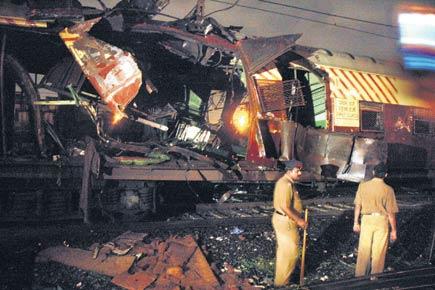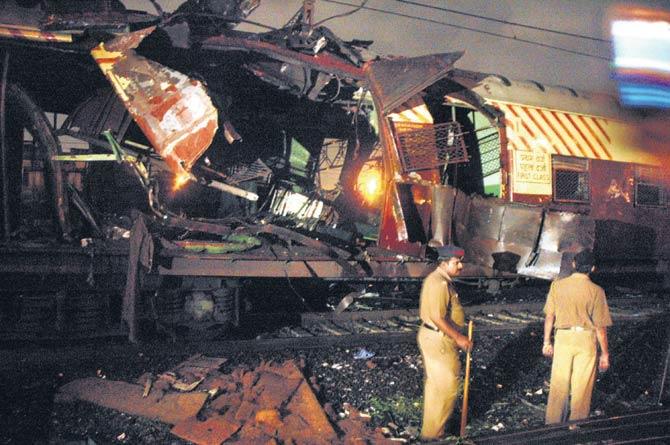Prosecution asks for the death penalty for 8 of the convicts in the 11/7 trains blasts case, including the 5 who planted the bombs, saying they deserved nothing less than death

Calling them ‘merchants of death’, the prosecution sought the death penalty for eight of the 12 convicts in the 11/7 train blasts case. Special Public Prosecutor Raja Thakare highlighted the roles of those eight, including the five who had planted the bombs, and said they deserved nothing less than death.
ADVERTISEMENT

Mangled remains of the first class compartment of a Virar-bound train in which one of the blasts occurred after the local left Mahim station. 188 people died after seven RDX bombs exploded in the first class coaches of seven local trains on July 11, 2006. File pic
He sought life imprisonment (till death) for the remaining four convicts. He also referred to the trial of Yakub Memon, who was eventually hanged for his role in the 1993 bombings, and argued why education, reformation or ill health should not count as mitigating circumstances for lenient sentencing.
The court will deliver its decision on the quantum of sentence on September 30. Thakare asked for death for Dr Tanvir Ahmed Ansari, Shaikh Alam Shaikh and Mohammad Sajid Ansari, as well as the five who had planted the bombs, Ehtesham Siddiqui, Asif Khan, Mohammad Faisal Shaikh, Naveed Khan and Kamal Ahamed Ansari.
Thakare told the court, “The timing and target chosen is very crucial. It is common knowledge that suburban trains on the Churchgate-Virar line are very crowded, and during peak hours, they are jam-packed. If blasts take place in running trains or at stations, they are bound to cause maximum casualties because of the rush.
Therefore, choice of the time and target also shows the extreme mentality of culprits who planted bombs.” He pointed out that terror acts in themselves were perverse phenomena. “The main objective of terrorists is to disturb the harmony of the society, disturb the even tempo, peace and tranquility to create a sense of insecurity among people.”
He referred to the convicts as merchants of death, and questioned why citizens should be taxed for their upkeep in case of a life term. He said, “The thinkers have posed a question - these are merchants of death, so why should honest taxpayers be liable for maintaining them for 40 to 60 years?”
‘No call for leniency’
Thakare also argued, “Young or old age cannot be used as mitigating circumstances. Similarly, ill health is also not considered as mitigating circumstances.” The defence had earlier presented that several of the convicts had made serious attempts to garner some education while in prison, and many of them had signed up for courses and earned degrees as well.
The defence had even called a teacher from the Indira Gandhi National Open University (IGNOU) to depose on behalf of the accused. However, Thakare pointed out that the IGNOU professor had said that the convicts studied in prison because they had a lot of time, and said this did not qualify as mitigating circumstances either.
“The accused showed no remorse or repentance. At this stage they are telling the court that they are reformed and that they have read 27 books of Mahatma Gandhiji, but this is not enough,” said Thakare. He also pointed out that in the past, there had been adverse reports about their misconduct in jail and in court, during the trial.
Life term for four?
However, Thakare said he would not insist on capital punishment for four of the convicts — Mohammad Majid Shafi, Muzzammil Shaikh, Soheil Mehmood Shaikh and Zamir Ahmad Shaikh. Instead, he sought life imprisonment for them. “The court may consider them on a slightly different footing than other eight.
If the court feels they deserve some leniency, my respectful submission would be that since they have been found guilty of multiple offences of life imprisonment, they may be sentenced till the end of their life and, in no event, less than 60 years.”
Yakub’s example
Special Public Prosecutor Raja Thakare referred to the trial of 1993 blasts convict, Yakub Memon, who was hanged in July for his role in the attack.
Thakare said Yakub was a Chartered Accountant by profession, and was considered to be a respectable person before the attack. However, this was not given weightage by the Supreme Court, and so education could not be considered as mitigating circumstances in this case either.
Thakare also said that the court had not shown leniency even though Yakub claimed he had been falsely implicated because he was the brother of prime suspect Tiger Memon. Neither was it considered mitigating circumstances that he had depression since 1996 and had served for 19 years in prison.
Defence speak
Defence advocate Yug Chaudhry said, “I can understand the rationality in asking for death for the five who planted the bombs, but can’t understand why for the others.”
 Subscribe today by clicking the link and stay updated with the latest news!" Click here!
Subscribe today by clicking the link and stay updated with the latest news!" Click here!






